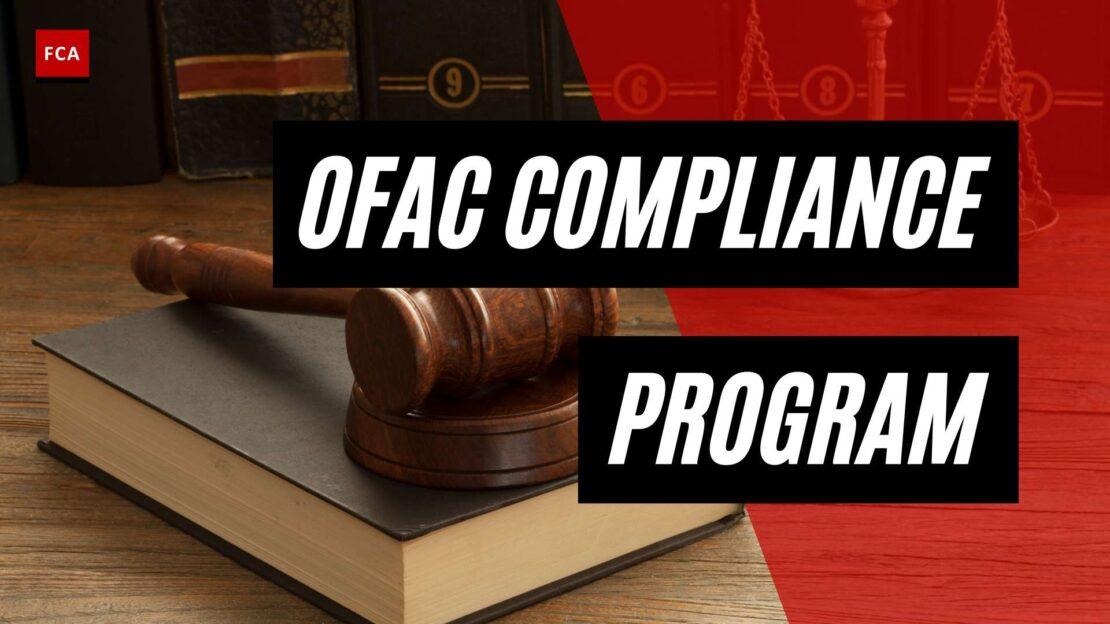OFAC Compliance Lawyer
The Office of Foreign Assets Control (OFAC) of the U.S. Department of the Treasury plays a crucial role in implementing economic and trade sanctions against various entities, jurisdictions, organizations, and individuals. This compliance program is critically important for any corporation or entity conducting transnational operations.
Our OFAC Attorneys and solicitors specialize in both the OFAC sanctions and compliance program, providing these individuals and organizations with essential legal support in matters of legal protection and prevention of violations.

What is OFAC Compliance Program?
The OFAC Compliance Program is a comprehensive framework designed to ensure that individuals comply with U.S. sanctions laws administered by the OFAC under the U.S. Department of the Treasury. This program encompasses the development and implementation of effective policies and procedures to identify and manage risks associated with OFAC’s sanctions regimes. Key elements of the OFAC sanctions compliance program include risk assessment, internal controls, employee training, audits, and reporting mechanisms. The program aims to minimize the likelihood of violations and ensure continuous compliance with OFAC sanctions compliance program and requirements.
Who is Subject to OFAC Compliance?
OFAC compliance requirements apply to all U.S. corporations and foreign companies conducting business in the U.S. or with American counterparts in foreign countries. Additionally, these requirements may affect foreign subsidiaries of U.S. companies and individuals transacting in U.S. dollars with foreign assets.
For non-U.S. entities, non-compliance with the OFAC sanctions and compliance program can lead to severe legal and financial consequences, such as hefty fines, asset blockades, and loss of access to the U.S. financial market. Thus, even if a company is not based in the U.S., it needs to implement an OFAC Compliance Framework to minimize sanctions risks and ensure long-term legal protection. Companies operating in foreign countries also need to comply with the OFAC Compliance Framework requirements to avoid similar risks.
Such companies include:
- Participants in International Transactions and Global Trade Activities Companies engaged in international trade and conducting numerous cross-border transactions.
- Businesses in High-Risk Sanctions Violation Regions (Central African Republic, China, Cuba, Iran, Iraq, Lebanon, Libya, Mali, Nicaragua, North Korea, Russia, Somalia and others).
- Companies Conducting Large-Scale International Business.
- Organizations Undergoing Frequent Corporate Changes (mergers, acquisitions, reorganizations).
- Financial Institutions with High Client Loads and Increased Risk (banks and other financial institutions).
- Providers of Electronic Products and Services.
- Organizations with Previous Encounters with OFAC.
- Companies Operating with Branches in Sanctioned Countries.
- Companies Changing Their Client Base Due to Mergers or Acquisitions in the Domestic Market.
Economic Sanctions Defense
The Office of Foreign Assets Control (OFAC) oversees multiple economic sanctions programs aimed at regulating, and often preventing, commercial and financial dealings with certain foreign individuals and organizations. U.S. banks and other entities within the country are required to comply with these sanctions at all times. This could involve avoiding forbidden transactions or managing restricted transactions under a general or specific OFAC license.
Non-compliance with OFAC’s sanctions can result in serious penalties. U.S. financial institutions and businesses may face asset freezes, federal probes, and, in some instances, criminal charges. Therefore, any U.S.-based entity involved in international transactions subject to OFAC sanctions must prioritize compliance. Additionally, they should be prepared to defend themselves if accused of violating OFAC’s sanctions programs.
Key Components of an OFAC Compliance Program
Risk Assessment
Risk Assessment in the context of OFAC sanctions compliance involves identifying and analyzing potential threats that can lead to serious violations and significantly damage your organization’s reputation and business. According to OFAC recommendations, every company must adopt a risk-based approach when developing or updating their Sanctions Compliance Programs (SCP). This approach includes conducting regular, and if necessary, ongoing risk assessments to identify potential issues.
Internal controls
Internal controls are a fundamental component of a robust Sanctions Compliance Program (SCP) as recommended by OFAC. These controls encompass clearly defined policies and procedures tailored to the organization’s risk profile, ensuring adherence to OFAC regulations and mitigating the risk of sanctions violations. Key elements include systematic screening of transactions and customers against OFAC’s sanctions lists, comprehensive due diligence processes, and effective communication channels to ensure all employees understand and comply with the regulations. Regular audits and updates to these controls are crucial to address any identified deficiencies or evolving risks, thereby enhancing the overall effectiveness of the SCP.
Testing and auditing
They are essential for ensuring the effectiveness of your Sanctions Compliance Program (SCP). Comprehensive and objective audits assess current processes and identify inconsistencies, allowing organizations to pinpoint weaknesses and deficiencies. Enhancing your SCP involves updating, improving, or recalibrating elements to address identified compliance gaps and adapt to changing risk assessments or sanctions environments. Whether focusing on specific components or conducting enterprise-wide reviews, testing and auditing ensure your program functions as designed.
Management commitment
Management commitment is crucial for the success of an organization’s Sanctions Compliance Program (SCP). Senior management must review and approve the SCP, ensuring the compliance unit has sufficient authority, resources, and autonomy to effectively manage OFAC risks. This includes appointing dedicated compliance officers, supporting comprehensive training, and fostering a culture of compliance where personnel can report misconduct without fear of reprisal. By promoting these values and actions, senior management demonstrates a serious commitment to mitigating risks and adhering to OFAC regulations.
Specialists at our sanctions law firm will conduct a comprehensive analysis of your activities, including clients, supply chains, intermediaries, counterparties, as well as geographic areas of operation, to identify and mitigate the risks of interacting with sanctioned entities and territories. OFAC lawyers pay special attention to risk assessment in the context of mergers and acquisitions, especially involving foreign companies, to avoid hidden threats and ensure full compliance with OFAC requirements.
Why Compliance Program is Important?
An OFAC sanctions compliance program is essential for companies to navigate changing legislation, avoiding legal violations and associated fines. For businesses with diverse operations, maintaining compliance is crucial due to varying risk exposures. A comprehensive OFAC compliance policy can lead to more favorable outcomes during investigations, helping mitigate legal risks. Understanding the OFAC compliance policy and adhering to its guidelines ensures companies are better prepared to handle regulatory scrutiny and avoid penalties, fostering a culture of proactive risk management.
Having a robust compliance program not only safeguards against potential violations but also enhances the organization’s reputation and operational integrity. In the event of an OFAC investigation, a well-documented and actively managed compliance program demonstrates the company’s commitment to lawful conduct, potentially reducing the severity of enforcement actions. This is particularly vital for companies engaged in international trade, financial services, or industries with high regulatory oversight. Regular training, auditing, and updating of the compliance program to reflect new regulations and risks are key components, OFAC Compliance program, that can make a significant difference.

Consequences of Not Having an OFAC Compliance Program
Non-compliance with OFAC sanctions compliance requirements can lead to serious legal, financial, and reputational consequences. Companies may face hefty fines, asset blockades, and business prohibitions. See our special article on OFAC sanctions non-compliance liability.
The most immediate legal consequence of not having an Office of Foreign Assets Control (OFAC) compliance program is the risk of substantial financial penalties. Companies found to be in violation of OFAC regulations can face hefty fines that can amount to millions of dollars. Another legal consequence is the freezing of assets. OFAC has the authority to block or freeze assets of individuals and entities that violate sanctions. If there are suspicions of violations, it is crucial to seek immediate legal assistance. For companies dealing with complex operations, international assets, and sanctions, obtaining an OFAC license may be necessary to legally navigate OFAC restrictions.
Assistance of OFAC Lawyer
OFAC lawyers and solicitors specializing in compliance offer comprehensive legal support other businesses, including the development of compliance programs, conducting internal investigations ofac own, and representing companies during OFAC compliance investigations. Engaging professionals from sanctions law firm is essential to protect your international assets and interests, and other businesses and ensuring compliance with relevant legislation.
Sanctions Lawyers by the Collegium of International Lawyers has successfully represented clients in a wide range of OFAC compliance matters, including the following:
- We advised a multinational medical device manufacturer on potential exposure to U.S. sanctions resulting from the use of U.S.-based information technology platforms to service customers in embargoed jurisdictions.
- We provided guidance to a global financial institution on the impact of the Venezuelan sanctions program on their financing of a joint venture project involving a private Venezuelan entity with a blocked person (SDN) as a minority shareholder.
- We advised a U.S. law firm on their ability to provide legal services to a blocked person (SDN) concerning potential defamation claims against a U.S. publisher.
- We counseled a foreign investment management firm on whether certain parties are constructively blocked under OFAC’s 50 Percent Rule.
- We advised a multinational manufacturer on their exposure to various U.S. sanctions programs, including the Iran and Venezuela sanctions programs.


